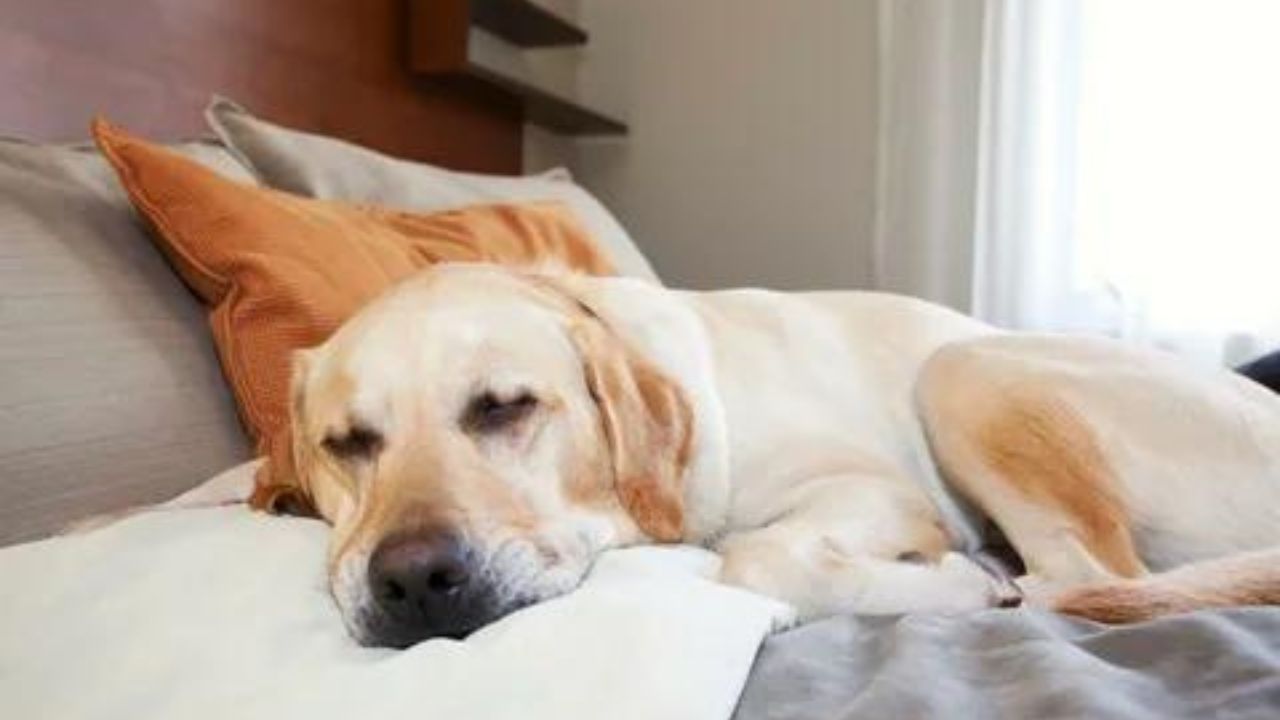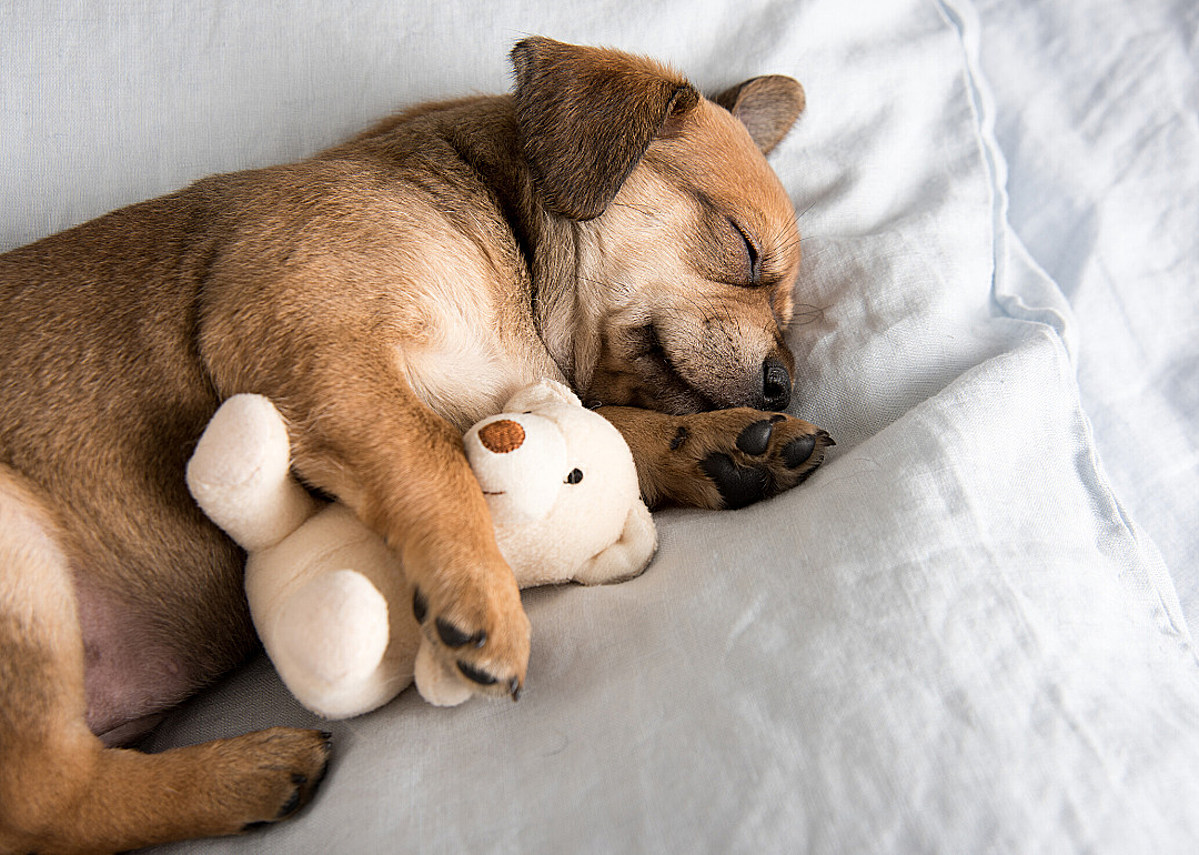
The joy of welcoming a new puppy into your home is incomparable. But along with the excitement comes the responsibility of ensuring your furry friend gets adequate rest for their overall well-being. Like humans, puppies require quality sleep to grow, develop, and maintain good health. However, various factors can influence the quality of their sleep. In this comprehensive guide, we delve into the intricacies of puppy sleep quality, exploring the factors that impact it and offering practical tips to promote better rest for your canine companion.
Puppy Sleep Patterns
Understanding the fundamentals of a puppy’s periods of sleep habits is crucial before exploring the variables influencing the quality of their sleep. Like adult dogs, puppies go through many phases of sleep, such as non-REM and REM (rapid eye movement).
Puppy REM sleep is characterized by rapid eye movements, relaxed muscles, and dreaming. Deeper, restorative sleep is a characteristic of non-REM sleep. Knowing these phases of sleep is the first step in understanding what affects a puppy’s quality of sleep. What affects puppy sleep quality?
Factors Influencing Puppy Sleep Quality

Age
The way that puppies sleep varies with age. Compared to adult dogs, little puppies—especially those under 16 weeks old—need more sleep. Puppies sleep for most of the day while they are newborns, and as they become older, they sleep less and less. It’s critical to provide a cozy resting space that meets their changing demands for rest.
Breed
The amount of sleep that dog breeds need varies depending on size, activity level, and genetic makeup. Larger breeds, for example, often sleep longer than smaller breeds and high-energy breeds could sleep shorter, more irregularly. Comprehending the unique sleep requirements of your puppy’s breed might assist you in customizing their sleeping environment.
Environment
Their resting surroundings greatly impact a puppy’s quality of sleep. A good night’s sleep is greatly aided by elements including comfort, illumination, noise levels, and temperature. Puppies do best in calm, low-light environments with cozy bedding that offers sufficient warmth and support.
A comfortable sleeping environment may also be achieved by making sure there is adequate ventilation and limiting disturbances. What affects puppy sleep quality?
Exercise and Mental Stimulation
Puppy sleep quality is directly impacted by daytime physical and mental stimuli. Sufficient physical activity aids in burning off extra energy, which encourages rest and improved slumber. By engaging in interactive play, training sessions, and enrichment activities, you may help your puppy develop a more peaceful sleep cycle by wearing them out and stimulating their brains.
Diet and Feeding Schedule
A healthy diet is essential for maintaining general health, which includes good sleep. A meal that is well-balanced and customized based on the age, breed, and amount of activity of your puppy guarantees that they get all the nutrients they need for healthy growth and development.
Setting up a regular feeding schedule also helps to control your puppy’s digestive system and reduces the likelihood of midnight awakenings brought on by pain or hunger.
Health and Medical Conditions
An underlying medical illness or health concern may cause a puppy’s sleep habits to be disturbed. Among the most common causes include parasite infestations, allergies, respiratory issues, and gastrointestinal distress.
It’s critical to keep an eye on your puppy’s behavior and to see a veterinarian if you see any indications of irregular sleep patterns or sleep problems. Not only may early diagnosis and treatment enhance the quality of your puppy’s sleep, but it also protects his or her general health.
Socialization and Routine
Puppies love regularity and interacting with people. A regular daily routine for eating, playing, exercising, and sleeping aids in regulating their internal clock and encourages healthier sleeping patterns.
Socialization with people and other animals creates a feeling of safety and acceptance, which lowers anxiety and encourages relaxation that is favorable to restful sleep. What affects puppy sleep quality?
Promoting Better Sleep for Your Puppy

Create a Comfortable Sleeping Area
Set aside a peaceful, comfortable nook or box for your puppy to sleep in. Ensure that the space is free from drafts and loud noises, and make sure the bed is cozy with supportive bedding.
Maintain a Consistent Routine
To aid with the regulation of your puppy’s sleep-wake cycle, set up a routine for feeding, playing, sleeping, and feeding.
Encourage Physical and Mental Stimulation
To encourage calmness and mental health, get your puppy moving and participate in enrichment activities daily.
Monitor Health and Address Concerns Promptly
Seek veterinarian treatment as necessary to address underlying health concerns influencing the quality of your pet’s sleep, and be on the lookout for any symptoms of pain or sickness.
Minimize Stress and Anxiety
Reduce distractions for your puppy, such as loud sounds, excessive activity, and schedule disruptions, to provide a peaceful, comforting atmosphere.
Conclusion
A puppy’s physical, emotional, and cognitive development depends on getting enough good sleep. You can make sure your pet has a happy, healthy life by learning what influences puppy sleep quality and putting helpful tips into practice to encourage more rest. You can support your puppy’s general well-being and build a close relationship with them by providing them with the right care and attention to their sleep needs.
FAQ
How can I improve my puppy’s sleep quality?
Make sure they have a regular nighttime routine, provide them with a comfortable, distraction-free resting space, make sure they receive adequate physical and mental activity during the day, and keep an eye on any health conditions that could interfere with their ability to sleep.
What should I do if my puppy is having trouble sleeping?
It is imperative to see a veterinarian to rule out any underlying health concerns if your dog is experiencing irregular sleep patterns or persistent difficulty falling asleep. They may offer direction and counsel based on the particular requirements of your puppy.
Can health issues affect a puppy’s sleep?
Yes, a puppy’s sleep might be disturbed by health issues including pain, discomfort, or intestinal difficulties. It’s crucial to keep an eye on your puppy’s behavior and see a doctor if you see any changes in how they sleep.
Why is a consistent routine important for a puppy’s sleep?
Puppies love consistency and routine. Creating a regular sleep pattern enhances the quality of their sleep and helps them manage their internal clock.
Is it normal for puppies to dream during sleep?
Yes, much like adult dogs, pups too typically dream while they sleep. When they’re asleep, you can hear them whining, twitching, or wiggling their paws, which is typically an indication that they’re dreaming.








